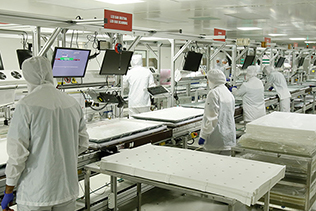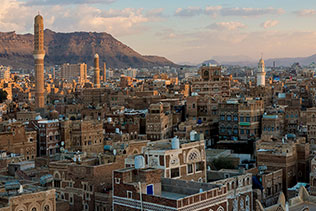Delivering Essential Supplies in a Conflict Zone
The company keeping food and medicine flowing in a crisis


Hayel Saeed Anam Group (HSA) began life in 1938 as a small shop in Aden, Yemen. Since then, it has grown into the country’s largest company, responsible not just for a vast range of products but much of Yemen’s infrastructure.

With the country gripped in a six-year conflict that shows no signs of abating, HSA was already well versed in keeping its products – including vital food and medicine – flowing during a time of crisis. But the pandemic propelled what were already some of the world’s most challenging circumstances into an even more dangerous situation.
Tasked with distributing crucial supplies in a pandemic-afflicted humanitarian crisis, HSA responded with the planet’s most comprehensive digital transformation – beginning with underground cables and ending with Microsoft Cloud.
Confronting infrastructure
Yemen’s infrastructure bears the scars of civil war. Roads and telephone towers are broken and creaking. Internet access is unreliable and primarily confined to cities. Physical data centers are perpetually at risk of becoming collateral damage to the conflict that surrounds them.


HSA has long been a major investor in Yemen’s infrastructure, pumping resources into repairing travel routes and maintaining communication networks, which are essential for distributing the company’s products and invaluable to the people living there.
When the virus arrived, the internet became even more crucial for HSA’s operations - the business was suddenly faced with migrating 20,000 employees, across 57 operating companies, to primarily virtual workflows. While in the west, this process can be as simple as building a plan and subscribing, in Yemen, it was considerably more complicated.
Investing in digital
Any good communications network needs a solid infrastructure, so HSA began with the fundamentals: Upgrading the copper internet cables to faster, more reliable fiber-optic.
In parallel, the company migrated to Microsoft Azure. HSA’s IT had been based in its local data centers. But with everybody working online, they needed a more reliable, more secure solution. Hosted overseas, Azure’s service was insulated from the conflict, and Microsoft’s world-class- cloud security ensured the company’s data was protected.
The move to Azure also served to consolidate existing disconnected systems, replacing them with a joined-up Office 365 and Teams set-up, which focused on remote collaboration.
A shift like this needs careful management since new technology needs onboarding with unfamiliar employees. In Microsoft, HSA found a partner who could support the training required to make the transition.

Building Yemen’s future
To date, 60% of HSA’s operating companies have migrated to Microsoft workflows, enabling the group to continue delivering vital supplies to millions of Yemenis during what the UN describes as the “world’s worst humanitarian crisis.”
But as Mohamed Khalifa, Chief Information & Technology Officer (CIO, CTO) at HSA, explains, the company views its digital transformation as more than just a short-term response to Covid-19. It is laying the groundwork for a time “when Yemen emerges from conflict.”
It is for this reason that the company has “invested hundreds of thousands in Yemen’s internet infrastructure” beyond its network, “introducing 21st-century connectivity to areas that had none before – paving the way for local economic development,” says Khalifa.
And HSA is committed to continuing its Microsoft-partnered digital training, injecting invaluable skills into the Yemeni workforce.
Having secured Yemen’s food and medicine supply, HSA’s digital transformation may yet secure the country’s future.
Microsoft helps businesses on their digital transformation journeys. Discover more.














































